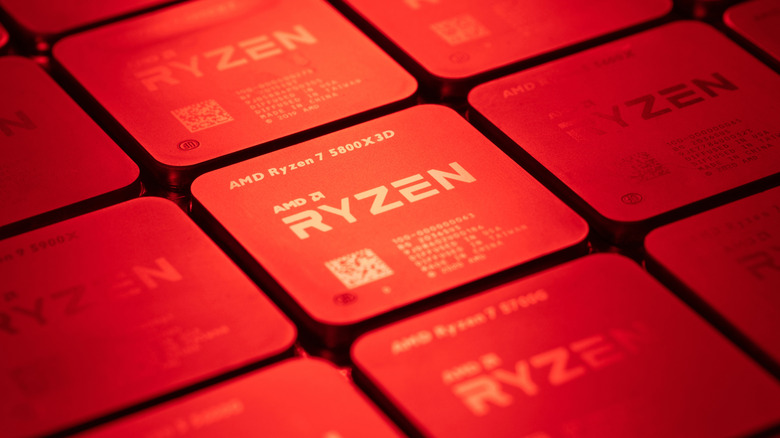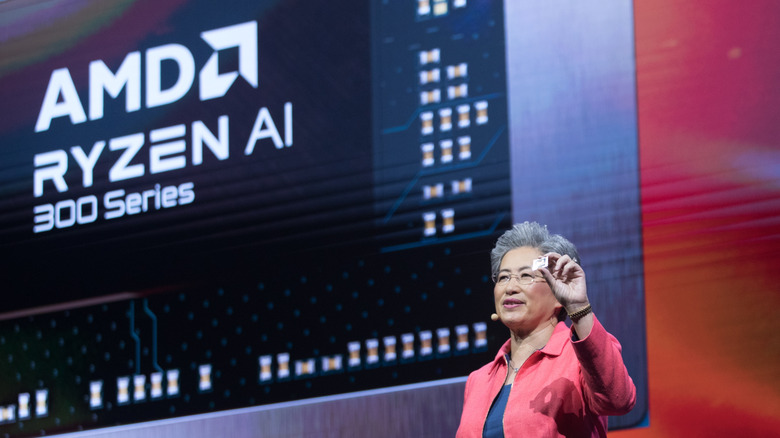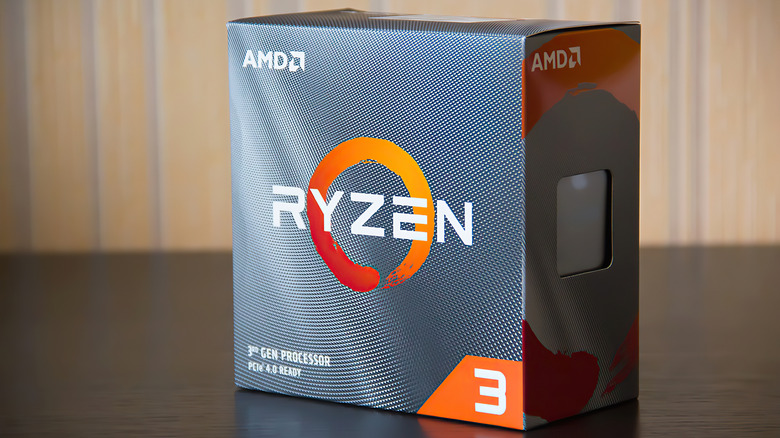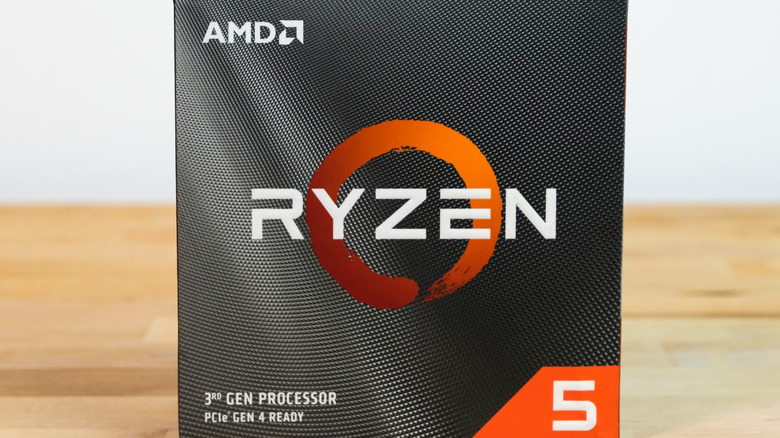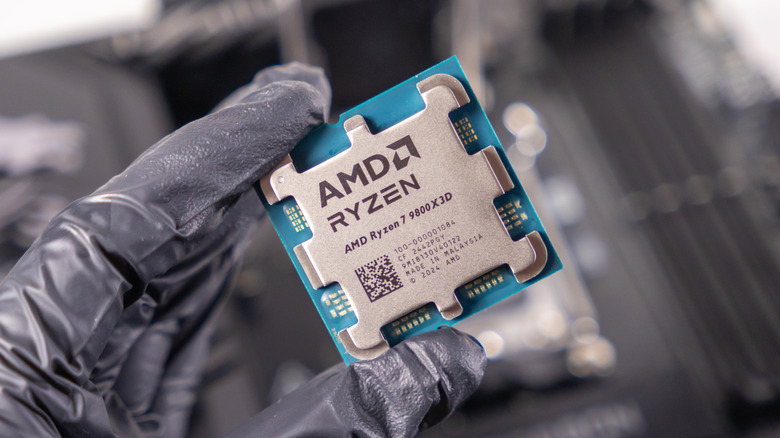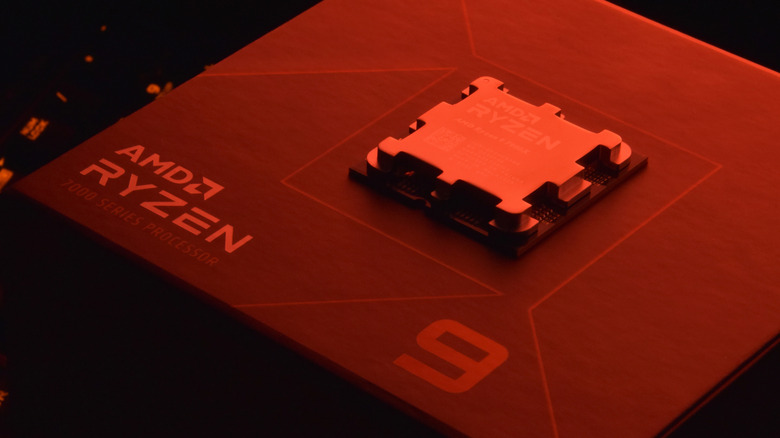What's The Difference Between AMD Ryzen 3, 5, 7, And 9 CPUs?
We may receive a commission on purchases made from links.
Consumer confidence in Intel's processor lineup is at an all-time low due to the well-publicized issues with the long-term reliability of the chipmaker's 13th and 14th-generation Core processors. Unless you're a hardcore PC hardware enthusiast who keeps close tabs on new CPU tech, it's not easy making the jump from the familiarity of the Intel Core lineup to that of AMD –- especially considering the daunting task of learning a whole new set of CPU nomenclature, hierarchies, and architectural complexities.
Even for those with deep pockets, throwing a lot of money at the problem doesn't guarantee the best performance or value. For example, an expensive workstation CPU, such as the AMD Ryzen Threadripper, optimized for productivity tasks, will run games poorly compared to the gaming-optimized Ryzen x3D chips sold at significantly lower price points. Fortunately, there's a method to this madness. The entire AMD lineup adheres to a well-established hierarchy, which makes it possible to zero in on the right CPU for your specific use case.
Choosing wisely from AMD's lineup of Ryzen chips is easier when you have a clear use case in mind (such as gaming or productivity), a specific budget range, and have figured out other limiting factors such as PC form factor (small form factor or full tower) or the need to restrict the processor choice to a specific motherboard chipset you own. Read on to learn how to differentiate between Ryzen 3, 5, 7, and 9 CPUs to make an informed purchase decision.
Understanding AMD Ryzen model numbers and suffixes
AMD's processor nomenclature may seem intimidating with in all its alphanumeric glory, but the same numbers and letters are quite handy to tell the relative difference between the lineup at a glance. Once you figure out the underlying logic, it's easy to decode everything from the processor generation, performance level, and specific features that help you zero in on the right chip for your specific use case.
Let's take a look at the Ryzen 9 9950X processor to see how that works. Ryzen denotes the brand name used for chips based on the Zen microarchitecture, which succeeded the Bulldozer microarchitecture associated with the AMD FX. That isn't important by itself because that encompasses all desktop AMD processors in existence since 2017. However, the number attached to it gives you an idea of the typical core count — which ranges from four cores for Ryzen 3 and six for Ryzen 5, goes all the way up to eight for Ryzen 7, and is 12 for Ryzen 9 chips.
The first number in the four-digit alphanumeric code (9950X) that follows tells us that the CPU belongs to the latest Zen 5 microarchitecture, which comes with a modest performance improvement compared to its Zen 4 counterpart, the Ryzen 9 7950X. The remaining two digits are used to further divide the lineup in terms of core counts and boost clock speeds. The 9950X, for example, bears 16 cores compared to the 12-core 9900X. Finally, the alphabet tacked on at the end signifies higher clock speeds (X), or gaming-specific variants equipped with 3D V-cache (X3D), and also the presence (G) or absence (F) of integrated graphics.
Ryzen 3: Budget-friendly but woefully outdated
AMD's Ryzen 3 series encompasses entry-level chips sporting a meagre core and thread count of 4 and 8, respectively. Initially intended for value-conscious buyers who don't value performance, its abysmally low core count makes it viable only for light-duty tasks like home theatre PCs, basic home computing, or gaming PCs for those who prefer older games.
Not surprisingly, the Zen 2 microarchitecture-based Ryzen 3 4100 launched way back in 2020 is the latest Ryzen 3 chip you can buy to build your PC as of the time of writing. Technically, AMD did launch the Zen 4-based Ryzen 3 8300G in 2024, but you can't buy it because it's exclusive to big-ticket system integrators like HP and, therefore, typically only found in pre-built PCs.
The fact that AMD hasn't released a Ryzen 3 chip accessible to individual PC builders is its way of nudging us towards the Ryzen 5 lineup as the bare minimum in this age of operating systems and video games demanding higher core counts. In fact, the six-core Ryzen 5 5500 regularly can be had for a mere $10 to $15 premium over the outdated Ryzen 3 4100.
Ryzen 5: The sweet spot for most users
The Ryzen 5 is AMD's veritable all-rounder, which is the entry-level offering now that the Ryzen 3 is relegated to cheap and cheerful pre-built PCs. Featuring 6 cores and 12 threads, these chips make short work of most productivity software as well as GPU-bound games rendered at higher resolutions. However, demanding content creation tools and modern AAA games that demand higher core counts will still pose a challenge; the latter is especially true when these CPUs are paired with high-end graphics cards.
If you prefer the latest Zen 5 chip, the Ryzen 5 9600X will handle most games and apps with its 6 cores and 12 processing threads running at a boost clock of up to 5.4 GHz. However, it is, on average, only about 10 to 12 percent quicker than its Zen 4 predecessor 7600X, so PC builders on a tight budget can divert the savings towards more RAM, a faster SSD, or a better GPU instead.
Those who don't care much about modern games can save substantially by opting for the Ryzen 5 8600G. It incorporates a pretty decent integrated graphics solution that's viable for less demanding games at lower resolutions. However, gamers with pockets deep enough for high-end graphics cards would be better served moving up to the next CPU tier instead.
Ryzen 7: Power for gamers and creators
The Ryzen 7 lineup is designed to deliver excellent performance across content creation applications like 3D rendering as well as video editing and high-end gaming alike. cater to enthusiasts who need high-performance CPUs for gaming, content creation, or multitasking. The 8 cores and 16 threads are adequate for all but the most demanding productivity tasks, but gaming is a whole different affair thanks to the 3D V-Cache found on the X3D chips.
The Ryzen 7 9800X3D regularly embarrasses higher-end Ryzen 9 processors in gaming benchmarks thanks to its 3D V-Cache and a microarchitecture that's highly optimized to deliver outstanding gaming performance. For eSports competitors who rely on high frame rates at lower resolutions, the X3D chips are worth their weight in gold due to their uncanny ability to eke out extra frames in such CPU-bound scenarios. Unfortunately, these chips are rarer than RTX 5090 GPUs at launch.
If you are considering the previous generation 7800X3D as a worthy alternative, you're not the only one with that idea because a record demand for the gaming-optimized chip has made it as costly as the unobtainable 9800X3D. That leaves us with the Ryzen 7 9700X, which is another Zen 5 processor that offers great, but not outstanding, gaming performance with its 5.5 GHz boost clock speeds while also being impressive at productivity tasks.
Ryzen 9: Ultimate performance for professionals
The Ryzen 9 series chips are AMD's flagship consumer CPUs meant for those who seek the absolute best in PC hardware. The 9900X features 12 cores and 24 threads, whereas the 9950X increases the core count to 16 with twice as many 32 threads. These processors are great for highly multithreaded applications such as running virtual machines, complex simulation models, 3D applications, and video rendering.
Although the flagship Ryzen chips, such as the Ryzen 9 9950X, boast a 4.3 GHz base clock a 5.7 GHz boost clock, they still aren't the best choice for gaming due to the presence of the more appropriate Ryzen 7 X3D chips that deliver significantly better framerates. Gamers with deep pockets are still better off saving the cash and opting for the X3D CPUs instead of AMD's flagship Ryzen offerings.
The same goes for anyone who isn't running the most demanding applications that can leverage the core count of these chips. Our Ryzen 7 recommendations are good enough for most gaming and productivity tasks.
